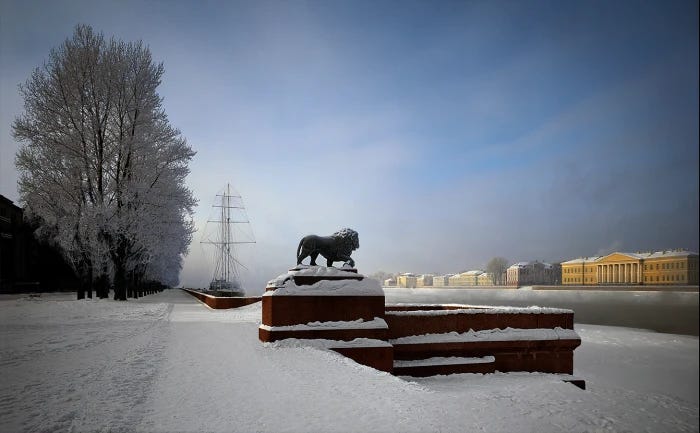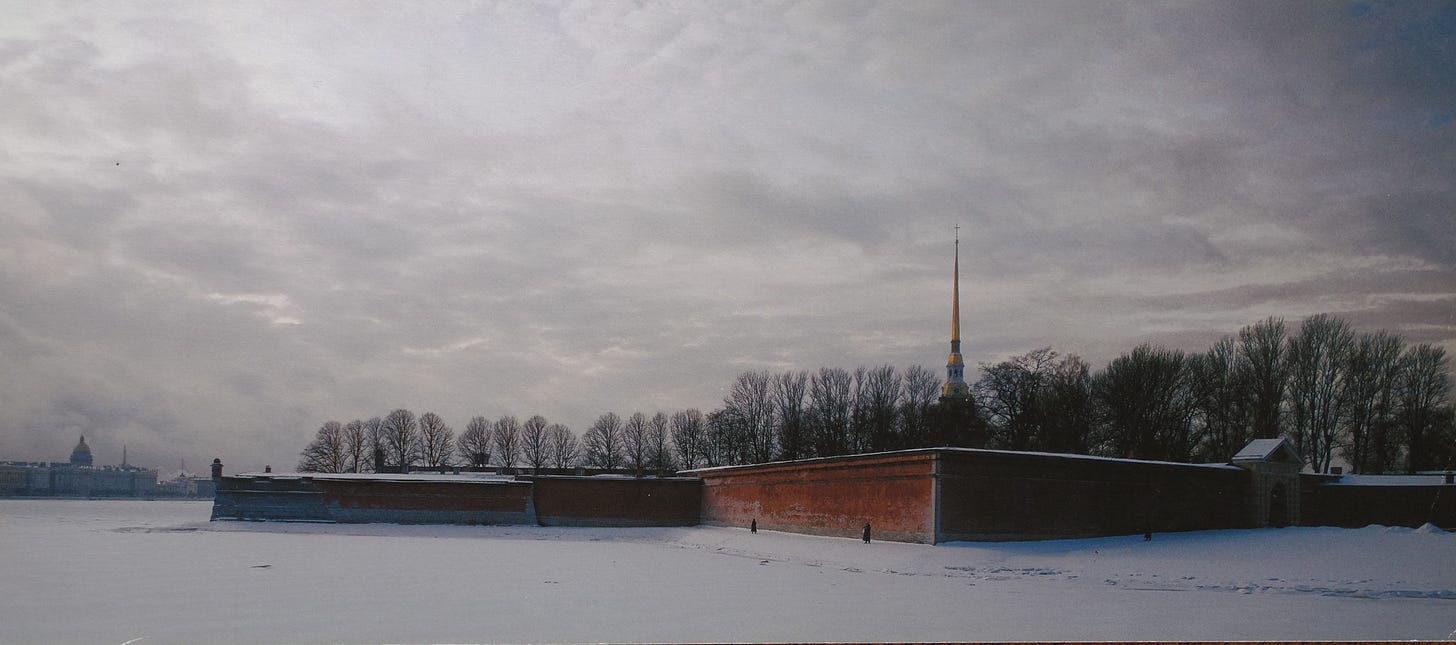[Note: this is normally a newsletter about bookish things. What follows is something only tangentially related to books, as it describes an obsession that has played out on paper as much as it has in my “real” life. Still, if this isn’t the kind of stuff you signed up for, feel free to skip this one. I hope to have more bibliophiliac goods in this space soon.]
Friends and colleagues often think that I’m joking when I say that I owe my Peace Corps service, my high school English career, my cross-continent move to Philadelphia, and my impending marriage to the academic language requirements for a bachelor’s degree at the University of Oregon. I am entirely serious when I say this to them, and I’m serious as I write it here. Had I followed my original plan to study ancient Greek or Chinese, I would never have fallen in love with Russian culture; without my love for Russian culture, I wouldn’t have joined the Peace Corps, exclusively choosing former Soviet states; if I hadn’t been sent to Armenia, I wouldn’t have met my (American) fiancee and would not have followed her to Philadelphia, a city neither of us had any connection to whatsoever, and where I became an English teacher. I suppose if I’d stuck with Chinese, I’d probably be in Chicago by way of Shenzhen with another life, neither better nor worse, but different from the one that I have now.
I don’t know if contingency is a real force in the world. Maybe there is only fate, or God’s will, or the ineluctable dance of atoms that were always going to swerve in their particular way, and my choice to study Russian was ordained from the beginning of time. It sure feels, though, like the entire direction of my life has depended on a small choice I made years ago, after no more than an hour's thought and a few old books I’d read as a teenager, that made me into a Russophile.
The friends of Russia are a strange tribe. In our ranks you find communists and conservatives, politicians and priests, nerds and hockey stars, Condoleeza Rice, Angela Merkel, Stephen Seagal. Even among writers, you find a divide between trendy, hip authors like Elif Batuman and George Saunders versus cranky old codgers like Clives James and Anthony Burgess. We all have our reasons, none of them as obvious to outsiders as, say, a passion for Korean K-Pop or a love of French cuisine. Even when you factor out politics, Russia has always been burdened with negative associations. The language is hard. The weather is atrocious. The food has few defenders. There is a vague sense of ballet, classical music, and novels by brooding, bearded men (Nabokov liked to call this imaginary, ur-Russian author lurking in his students’ minds Tolstoyevsky), but most people don’t like classical music and most people don’t read books.
Although I can’t speak for Condoleeza Rice or Stephen Seagal, I know I’m not alone when I say that Russophilia can change your life. I was thinking about how much it’s changed mine as I read Lesley Blanch’s wonderful memoir Journey into the Mind’s Eye, describing in loving, languorous detail how a childhood fascination with Siberia led her to abandon her bourgeois English background and spend a long, rambling life in Russia and Central Asia, taking on Russo-Kirghiz lovers and swooning over battlegrounds from the Murid War. Blanch’s memoir was clarifying, and reminded me why I love Russia: because Russians can be wonderful, and because Russia is a wonderfully baffling place.
Russia is the kind of place where a dusty provincial capital of the Mongolian Khanate can declare itself the Third Rome, successor to the Roman and Byzantine Empires and successfully shake off Mongolian rule. Russia is where bearded, medieval barons gathered their resources and built a New Venice for the Age of Enlightenment in the frigid muck of a Finnish swamp, and where peasants and intellectuals overthrew the monarchy and turned themselves into a spacefaring, industrialized superpower in the span of a lifetime.
We should be wary when speaking of national character, especially of 150 million people stretching from Rostov to Vladivostok, but all available evidence suggests that when you put a bunch of Russians together, strange things happen and bizarre ideas emerge. At its imperial height, the Tsar once seriously considered annexing Hawaii and ruling it as a Russian oblast from his perch on the Baltic Sea, six thousand miles away; that same Tsar, Alexander I, almost certainly died of typhus in 1825, but among the peasantry it was an article of faith well into Soviet times that the weary emperor had simply disappeared into the Siberian wilderness to live as a holy hermit. A similar story played out two centuries later when a traffic cop from Krasnodar declared himself the reincarnation of Jesus Christ and established a hippie commune in the taiga. In 1978, Soviet geologists once ran into a family of Old Believers–a kind of Orthodox Amish–who had been living in complete isolation in the wilderness for forty years without even metal tools, and in the span of a few days were introduced to such concepts as electricity, television, and the Second World War. Soviet scientists also once dug the deepest hole in the world just to see what was there. Russia is a place where anything can happen, and frequently does.
All of this is to say that Russia and the Russian people are far greater than whatever narrow political role we cast them in, and that their unique place in the world is more important than whatever horrible decisions the Kremlin is making this week. Like just about everybody else in the world, from tech executives to the Taliban, I am dismayed and frightened by the Russian invasion of Ukraine. Like most Westerners, I am “rooting” for the Ukrainians to enjoy peace, prosperity, and security. I don’t think Russia has anything to gain from occupying Ukraine, and I want the Russian military to leave immediately.
Where I part ways with the consensus, though, is the rapturous pouring of Russian vodka down the drain, canceling lectures on Dostoevsky or concerts of Tchaikovsky’s music, the proposals to expel Russian graduate students. I am baffled by the sudden profusion of Ukrainian flags on car bumpers and rear windows, some of them unknowingly placed upside-down, or the adulatory memes of President Volodimir Zelensky, and the strange certainty about no-fly zones and economic sanctions and post-imperial ethnic policies in Eastern Europe among people who cannot explain the difference between Украина and Україна. I said above that I support the Ukrainians, but even more than that I support an end to the war by the fastest, most peaceful means necessary. When I see the smug pleasure in Western social media over Ukrainian victories and Russian setbacks, the complete lack of hesitation among so many people to be so certain about a conflict that is so new, and the obvious pleasure such a large number of my fellow citizens take in finally having a “good” war, I want to scream that wars are not like football games.
I still love Russia, and I share Justin Smith’s view that cheering for Ukraine by demonizing Russia is a bloody-minded meanness of spirit dressed up as righteousness.
We don’t have to cheer for the Russian sons, brothers, and fathers destroying Ukraine–I am not–but we also don’t need to express such ghoulish joy when we hear that they are starving, disorganized, miserable, and dying. Arnold Schwarzenegger, of all people, is right to express sympathy to the Russian veterans of this war. Like his own father, who fought for the Nazis in their own idiotic, futile Eastern European campaign, these men will spend the rest of their lives crippled physically and mentally, wracked with guilt, shame, and bitterness. I don’t want these young men to suffer and die: I want them to go home.
Maybe all of this is obvious to right-thinking people, and I know that they’re out there. But so much of the conversation is driven by noisy fools on the Internet milling around, and the conversation is growing very goddamned loud.
Like many Russia-watchers, I have my own interests and hunches about the future of Russia. Barring a late elopement to the taiga to become a holy fool like Alexander I, Vladimir Putin will go down in the history books as another brutal, violent dictator. But Russia has outlasted these men before, and will outlast Putin, too. Russia may be the land of the Tsars, but it is the land of the Decembrists, the February Revolutionaries, and even—why not?—the stilyagi hipsters and Tolstoyan hippies. There are other paths Russia might have taken in the past, and might still in the future. But in order to get there, Russians will need friends and acceptance, not enemies and exile. The West will need its friends in Russia, just as Russia will need its Russophiles abroad.




